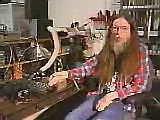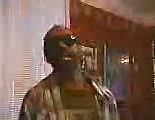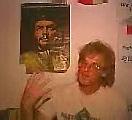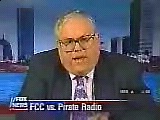| Site
Highlights: XML/RSS
Feed
Content update action
Site Search
Powered by Google
News
Archives
Organized by month
Latest
Schnazz
Newly-found links
FCC
Watch
-Enforcement
Database
-FCC Features
Media
Collage
-Truthful
Translations
-Celebrity Speech
-Consumer Collage
A/V
Library
-Featured MP3s
-Misc. Goodness Features
Index
-Digital Radio Articles
-Microradio in the U.S.
-General Pirate Radio
-LPFM Archives
Links
Directory
1,000s and growing!
Mbanna Kantako
-News/Commentary
-Music
Buy Me A Book!

|
Note: Clicking on any bordered pictures in this feature spawns
a clip from the documentary
Real Player required
The
last time someone chronicled the story of free radio in the United States
on video or film was Pump Up the Volume, and before that there
was only one DIY-style video out there, which has long ceased production
and distribution.
 The story of modern microradio had
yet to be told; enter Kevin Keyser,
a field producer working in mainstream TV news on the West Coast. He once
did a story for his station on Stephen Dunifer and Free Radio Berkeley
and was intrigued by the concept of unlicensed broadcasting. Unfortnately,
the story that ultimately aired didn't do Dunifer justice - as was the
problem with much of the news Keyser found himself covering. It wasn't
his fault, though - it was the medium's. The story of modern microradio had
yet to be told; enter Kevin Keyser,
a field producer working in mainstream TV news on the West Coast. He once
did a story for his station on Stephen Dunifer and Free Radio Berkeley
and was intrigued by the concept of unlicensed broadcasting. Unfortnately,
the story that ultimately aired didn't do Dunifer justice - as was the
problem with much of the news Keyser found himself covering. It wasn't
his fault, though - it was the medium's.
"I would sometimes spend an entire
day with people and then see it boiled down to a 2 minute story on our
show that night that just barely scratched the surface," says Kevin.
Having previously realized a penchant for documentary films, Keyser was
intrigued enough by his day with Dunifer to dig deeper into the microradio
movement.
The story got more compelling, and in
July, 1999 Keyser set out with a brand-new digital video camera and a
mission - to chronicle the stories of the free radio movement across the
country, in hopes of explaining what it is that makes radio pirates defy
the law.
 Free Radio: A Documentary was put together with less than $5,000 and a home computer.
"There is no way this would have been possible [10-15] years ago,"
Kevin says. He hired a cameraman to help him cover one event, but the
rest he shot himself. Free Radio: A Documentary was put together with less than $5,000 and a home computer.
"There is no way this would have been possible [10-15] years ago,"
Kevin says. He hired a cameraman to help him cover one event, but the
rest he shot himself.
Chronicling the Rise
The
documentary, as a history of microradio from the late 1980s to early 1990s,
is remarkably complete. Keyser visits with the true father of U.S. free
radio, Mbanna Kantako, who's
been running Human Rights Radio in Springfield, IL straight on since 1986.
Kantako is legendary for his accomplishment - running a station for so
long and in such open defiance that it boggles the mind. What began as
a way to shed some light on police brutality in a housing project isn't
just a station anymore. It's branched out into after-school programs and
true community improvement for the African youth of Springfield.
 "He has been evicted, arrested,
etc., and his family has been continually harassed by local authorities.
Somehow, through all of this, he has managed to keep his course and go
on the air every night and not let these people intimidate him. He's also
a real character and a funny guy," says Kevin. "He has been evicted, arrested,
etc., and his family has been continually harassed by local authorities.
Somehow, through all of this, he has managed to keep his course and go
on the air every night and not let these people intimidate him. He's also
a real character and a funny guy," says Kevin.
Also included are perspectives on the movement
from other instrumentals like Stephen Dunifer of Free
Radio Berkeley, "Captain Fred" of Berkeley Liberation Radio,
"Skidmark Bob" from Free
Radio Santa Cruz, and two members of Free
Radio Austin - just to mention a few from an incredibly diverse cast
of rogue radio personalities.
One Keyser thinks especially highly of is Micro
KIND Radio in San Marcos, Texas. Run by Joe Ptak and Zeal Stefanoff,
the station ran 24-7 in two-hour increments, with the microphone open
to all, until it was silenced by court order in September, 2000.
"I especially like how KIND Radio
does things and allows everyone, even the [Ku Klux] Klan, to be on the
air. Free speech is all about protecting all kinds of speech, especially
the most unpopular speech," he says.
 Getting
Both Sides Getting
Both Sides
Free
speech may be a primary force that spurs free radio activists into action,
but there's lots of other reasons, too. Corporate control of the
airwaves is a huge beef. And pirates have been known to take their beefs
straight to the source, as evidenced by protests at FCC and NAB Headquarters
and at the NAB's annual conventions.
These "bad guys" make an appearance on Free Radio, too,
and reveal themselves for what they are. Keyser discovered a snippet of
a Fox News interview conducted with Stephen Dunifer and Tom Star from
Talk America radio networks, who was speaking on behalf of the radio industry.
In the clip, Star tries to argue that pirate radio hinders free speech,
and, in the process, subliminally admits that the broadcast industry stifles
it.
 "I like that clip. It's seems
to get the biggest laughs when a crowd is watching it," says Kevin. "I like that clip. It's seems
to get the biggest laughs when a crowd is watching it," says Kevin.
Other spokesmen from the NAB and FCC are also consulted for their perspectives,
if only for the sake of balance. "I basically flew to DC without
either one saying, 'Yes.' I guess perseverance and a bit of stalking might
have helped," Kevin muses.
NEXT
PAGE: Up-to-Date
|